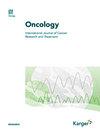一项多中心研究:确定用于评估化疗加 nivolumab 作为不可切除的晚期或复发性胃癌患者一线治疗疗效的生物标志物。
IF 2.5
3区 医学
Q3 ONCOLOGY
引用次数: 0
摘要
简介在这项研究中,我们旨在确定预测化疗加 nivolumab 治疗结果和疗效的生物标志物,以及预测免疫检查点抑制剂的免疫相关不良事件(irAEs)特征。方法这项多中心研究纳入了 104 例接受化疗加 nivolumab 作为不可切除的晚期复发性胃癌主要治疗方法的患者。在治疗开始前和两个疗程后收集血液检测结果。结果共有 57 例(54.8%)患者获得了完全或部分应答。疾病稳定(SD)/疾病进展(PD)组的 LAR 显著增加(P=0.018)。结论LAR与最佳治疗反应相关;因此,它可能是治疗结果和疗效的潜在生物标志物。本文章由计算机程序翻译,如有差异,请以英文原文为准。
Identification of biomarkers for assessing treatment efficacy of chemotherapy plus nivolumab as the first line in patients with unresectable advanced or recurrent gastric cancer: a multicenter study.
INTRODUCTION
In this study, we aimed to identify biomarkers for predicting treatment outcomes and efficacy of chemotherapy plus nivolumab, as well as predict immune-related adverse events (irAEs) characteristics of immune checkpoint inhibitors.
METHODS
This multicenter study included 104 patients who received chemotherapy plus nivolumab as the primary treatment for unresectable advanced recurrent gastric cancer. Blood test results were collected before the start and after two courses of treatment. The neutrophil-lymphocyte ratio, prognostic nutritional index (PNI), and lactate dehydrogenase/albumin ratio (LAR) were examined after treatment in each case to determine changes compared to values before the start of treatment.
RESULTS
A total of 57 (54.8%) patients experienced a complete or partial response. The LAR of the stable disease (SD)/progressive disease (PD) group significantly increased (p=0.018). An examination of the presence of grade ≥3 irAEs and changes in related factors showed that the LAR of all patients increased.
CONCLUSION
The LAR was correlated with the best therapeutic response; therefore, it may be a potential biomarker of treatment outcomes and efficacy.
求助全文
通过发布文献求助,成功后即可免费获取论文全文。
去求助
来源期刊

Oncology
医学-肿瘤学
CiteScore
6.00
自引率
2.90%
发文量
76
审稿时长
6-12 weeks
期刊介绍:
Although laboratory and clinical cancer research need to be closely linked, observations at the basic level often remain removed from medical applications. This journal works to accelerate the translation of experimental results into the clinic, and back again into the laboratory for further investigation. The fundamental purpose of this effort is to advance clinically-relevant knowledge of cancer, and improve the outcome of prevention, diagnosis and treatment of malignant disease. The journal publishes significant clinical studies from cancer programs around the world, along with important translational laboratory findings, mini-reviews (invited and submitted) and in-depth discussions of evolving and controversial topics in the oncology arena. A unique feature of the journal is a new section which focuses on rapid peer-review and subsequent publication of short reports of phase 1 and phase 2 clinical cancer trials, with a goal of insuring that high-quality clinical cancer research quickly enters the public domain, regardless of the trial’s ultimate conclusions regarding efficacy or toxicity.
 求助内容:
求助内容: 应助结果提醒方式:
应助结果提醒方式:


